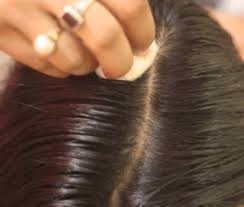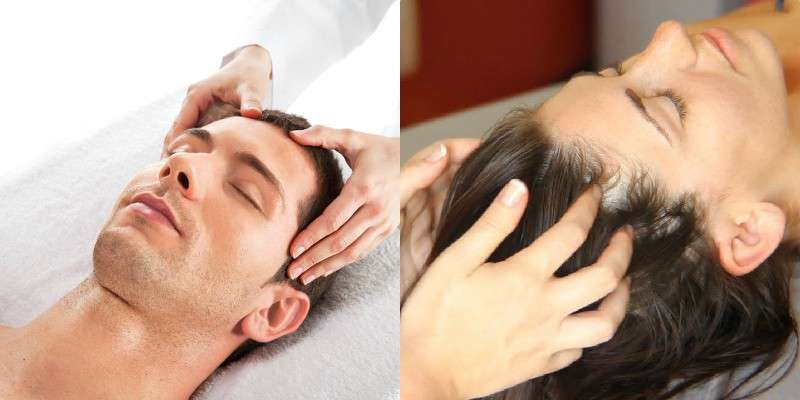
We rarely treat our scalp respectfully. Below our hair lies the sensitive skin of scalp. It is very sensitive which like the rest of our body consists of layers of tissue. The lower layers are the healthiest because it consists of the newest skin produced by our body. Whereas, the outermost layer which we brush/comb consists of cells that are mostly dead tissue and ready to be shed to reveal the newer layers of skin beneath. Along with hair follicles, the skin of scalp contains sebaceous glands, which produce the oil necessary to keep the skin of scalp lubricated. A healthy scalp care routine involves regular cleansing to remove bacteria, sweat and excess oil from the skin. Taking steps to prevent over-drying and to boost the skin cell turnover process may also be necessary, depending upon your skin type and the environment in which you live.
For keeping scalp rejuvenated we need to treat it with beneficial oils; the best in my opinion is coconut oil. The moisturizing effect of coconut oil is the best. The effects can help treat dandruff and dry skin simultaneously. The scalp needs oil massage 3-4 times a week. Also try and incorporate iron, zinc, and folic acid into your diet. Zinc will help keep hair on your head and dandruff off it. Folic acid will encourage cell renewal in your scalp. Iron helps prevent thinning and discoloration of your hair. Good sources of these nutrients include oysters, peas, lentils, and prunes.
The following tips help retain your scalp healthy year-round:
Exfoliate it regularly: To help boost the skin cell turnover process, exfoliate your scalp on a regular basis. If you suffer from dry skin or psoriasis, you may need to exfoliate two or three times per week; otherwise, exfoliating once weekly is generally adequate to remove dead skin cells from the surface of your scalp. A gentle facial scrub can be used even on scalp with apricot or walnut kernels or oil beads which help a lot to promote exfoliation before you shampoo.
Preserve moisture in scalp: Most common scalp problems arise due to dryness of skin or are infuriated by dehydrated tissue. When you shower and bathe, avoid exposing your scalp to hot water. Instead, use lukewarm water for rinsing, which allows more of the natural sebum necessary for moisturizing the tissue to remain on your scalp. As far as possible, skip blow-drying and allow your hair to naturally air dry to give the skin on your scalp.

Regularly massage: Beneath the skin on your scalp is an intricate network of blood vessels that carry oxygen and vital nutrients to the tissue. Give a gentle massage in circular motion going in your scalp by massaging the skin when you lather in the bath or shower. Then, at least once per week, spend 5 to 10 minutes massaging your scalp, using gentle circular motions. If possible, get a professional scalp massage.
Limit chemical treatments: Limit hair perm, straightening or hair coloring treatment; the chemicals used in these treatments can dry out and irritate your scalp.
Use a gentle shampoo for regular use: For many people, washing hair once per day is ideal, though if you suffer from some scalp problems or damaged hair, you may need to wash less frequently. Cleansing is one of the most important parts of scalp care, but what you shampoo with is just as important as how often you do it. It’s advised to use a shampoo that has basis in natural ingredients or those geared toward your specific scalp problems.
Protect your scalp from the sun: When you plan to be in the sun for long periods of time, wear a hat or a scarf to protect your scalp. The ultra violet rays and harsh sun burns are not good for the scalp.
Eat right: Please remember that a well-balanced diet rich in fruits and vegetables will help supply the skin of the scalp with the raw materials necessary to produce new, healthy cells. Consume two to four servings of fruits and three to five servings of vegetables per day. In addition, include servings of meat, poultry, fish, eggs and nuts to ensure that your body has an adequate supply of protein, which is necessary both for scalp care and a healthy head of hair.
Some common scalp problems include dandruff,
scalp eczema, scalp psoriasis, impetigo, follicultis etc. Skin that is too dry
or too oily is more likely to develop these problems. A healthy immune system
can protect most scalp problems.
A healthy
scalp is the key to lush, shiny hair! Treat it with lots of love.












































